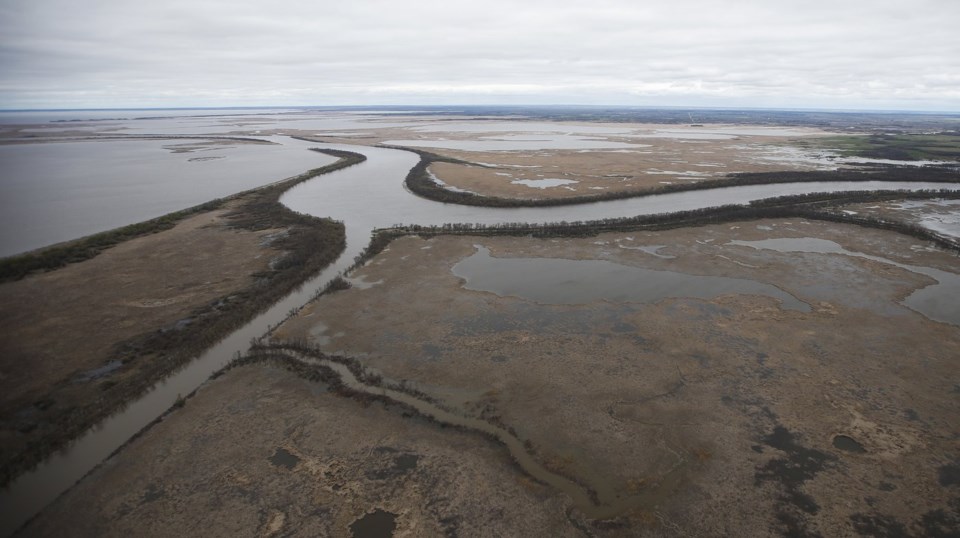WINNIPEG — A court has been asked to declare Lake Winnipeg a person with constitutional rights to life, liberty and security of person in a case that may go further than any other in trying to establish the rights of nature in Canada.
"It really is that simple," said Grand Chief Jerry Daniels of the Manitoba Southern Chiefs' Organization, which filed the suit Thursday in Court of King's Bench in Winnipeg.
"The lake has its own rights. The lake is a living being."
The argument is being used to help force the provincial government to conduct an environmental assessment of how Manitoba Hydro regulates lake levels for power generation. Those licences come up for renewal in August 2026, and the chiefs argue that the process under which those licences were granted was outdated and inadequate.
They quote Manitoba's Clean Environment Commission, which said in 2015 that the licences were granted on the basis of poor science, poor consultation and poor public accountability.
Meanwhile, the statement of claim says "the (plaintiffs) describe the lake’s current state as being so sick that she is dying."
It describes a long list of symptoms.
Fish species have disappeared, declined, migrated or become sick and inedible, the lawsuit says. Birds and wildlife including muskrat, beavers, duck, geese, eagles and gulls are vanishing from the lake's wetlands.
Foods and traditional medicines — weekay, bulrush, cattail, sturgeon and wild rice — are getting harder to find, the document says, and algae blooms and E. coli bacteria levels have increased.
Invasive species including zebra mussels and spiny water fleas are now common, the document says.
"In Anishinaabemowin, the (plaintiffs) refer to the water in Lake Winnipeg as moowaakamiim (the water is full of feces) or wiinaagamin (the water is polluted, dirty and full of garbage)," the lawsuit says.
It blames many of the problems on Manitoba Hydro's management of the lake waters to prevent it flushing itself clean every year.
"She is unable to go through her natural cleansing cycle and becomes stagnant and struggles to sustain other beings like animals, birds, fish, plants and people," the document says.
The defendants, Manitoba Hydro and the provincial government, have not filed statements of defence. Both declined to comment on the lawsuit.
Daniels said it makes sense to consider the vast lake — one of the world's largest — as alive.
"We're living in an era of reconciliation, there's huge changes in the mindsets of regular Canadians and science has caught up a lot in understanding. It's not a huge stretch to understand the lake as a living entity."
The idea has been around in western science since the 1970s. The Gaia hypothesis, which remains highly disputed, proposed the Earth is a single organism with its own feedback loops that regulate conditions and keep them favourable to life.
The courts already recognize non-human entities such as corporations as persons.
Personhood has also been claimed for two Canadian rivers.
Quebec's Innu First Nation have claimed that status for the Magpie River, and the Athabasca Chipewyan First Nation in Alberta is seeking standing for the Athabasca River in regulatory hearings. The Magpie's status hasn't been tested in court and Alberta's energy regulator has yet to rule on the Athabasca.
Matt Hulse, a lawyer who argued the Athabasca River should be treated as a person, noted the Manitoba lawsuit quotes the use of "everyone" in the Charter of Rights and Freedoms.
"The term 'everyone' isn't defined, which could help (the chiefs)," he said.
But the Charter typically focuses on individual rights, Hulse added.
"What they're asking for is substantive rights to be given to a lake. What does 'liberty' mean to a lake?
"Those kinds of cases require a bit of a paradigm shift. I think the Southern Chiefs Organization will face an uphill battle."
Hulse said the Manitoba case goes further than any he's aware of in seeking legal rights for a specific environment.
Daniels said he believes the courts and Canadians are ready to recognize humans are not separate from the world in which they live and that the law should recognize that.
"We need to understand our lakes and our environment as something we have to live in cohesion with."
This report by The Canadian Press was first published Sept. 19, 2024.
— By Bob Weber in Edmonton
The Canadian Press



